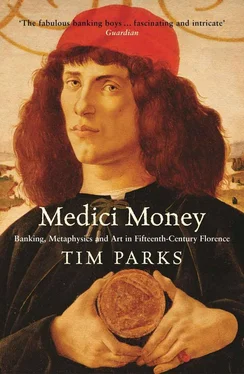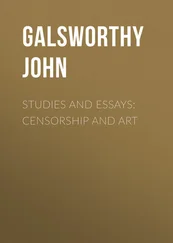Another appeal from Lucca to Visconti produces Niccolò Piccinino. Is there no end to Milan’s resources? This time Florence can’t afford to buy him off. This time Piccinino lives up to his star status by defeating the Florentines at the Serchio. Beaten, they take refuge in Pisa, just in time to stop a rebellion there. Which was lucky. Cosimo meanwhile has taken the very wise step of resigning from the war committee to “give others a chance to serve.” Having rooted for the war like everyone else, the Medici have had the good luck of not actually being responsible for defeats in the field. People are blaming Rinaldo degli Albizzi. Meantime, the highly respected Uzzano has died, depriving the ruling faction of a certain gravitas. When an ignominious peace is made in 1433, the town is bitterly divided. “Every case that came before the magistrates,” says Machiavelli, “even the least, was reduced to a contest between them [the Medici and the Albizzi].”
Is there any legal way to resolve that contest? No. If the real power in a state is unofficial, then any transfer of that power must also be unofficial. This is the modernity of Florence. As with many democracies today, the constitutional mechanism is only half, perhaps less than half of the story when it comes to appointing the executive. Profound shifts of power occur outside the legal framework. The problem for the Albizzi and the Medici is that the moment a real conflict is joined, the unconstitutionality of their positions will be evident. With what results, no one knows. Perhaps a return to constitutional legality, to a truly independent, randomly chosen government. Neither party wants that.
Time is on the Medici side. Cosimo is getting richer. The branches in Rome, Venice, and Geneva in particular are producing healthy profits, the first through collecting Church tributes, the other two through exchange deals along Europe’s busiest trading routes. To the sick, cash-starved city of Florence, Medici money seems to possess curative powers. Cosimo has been draining the resources of the Florence branch of the bank to make extra loans for the war effort. If he held power, perhaps he would be even more generous. He would have the wherewithal to look after the city. People are beginning to make puns on the name Medici — doctors. And it’s not just the surname. Cosimo’s name saint, St. Cosma, and his brother, St. Damiano, were doctor saints who performed miracles of healing. Cosimo had had a twin brother, appropriately named Damiano, who died at birth. Now in his mid-forties, and ironically in pretty poor health, the leader of the Medici clan is well aware that Rinaldo degli Albizzi must see him as a threat.
On May 30, 1433, Cosimo transfers 15,000 florins from Florence to Venice, sells 10,000 florins’ worth of personally held government bonds to the bank’s Rome branch, and deposits 3,000 Venetian ducats in the Monastery of San Miniato al Monte and a further 5,877 ducats in the Monastery of San Marco. He and his father have given generously to the Church over the years. Now the sacred and the profane are getting very seriously mixed up. Hidden among the miracle-working bones of long-dead martyrs, or wrapped in what might have been Christ’s shroud, Medici money is at hand to satisfy local customers if the political situation leads to a run on the bank — Cosimo mustn’t lose people’s confidence by asking them to wait for a withdrawal. On the other hand, it is safely out of the way should the Albizzi, or an Albizzi-controlled government, try to confiscate his wealth.
FOR MOST HISTORIANS, Cosimo is the innocent victim of what happens next. He is also a political genius. The unanimity of this paradoxical view is striking. Rinaldo degli Albizzi is written off as a tyrant and a prig. He was opposed to Cosimo’s humanist friends, the historian Christopher Hibbert complains, because he saw them as dangerous for Christianity. A bigot. But Rinaldo was right. The humanists certainly represented the first step toward the secularization of the West. That is not to say they were not Christian. Had they opposed Christianity, they would have been swept aside immediately. But their interests lay elsewhere, and their determination to see each written text as the product of a particular period of history would ultimately lead to an entirely different view of the Bible. At the level of political institutions, as early as 1440 the humanist Lorenzo Valla would demonstrate, through able textual scholarship, that the supposedly fourth-century Donation of Constantine, by which Constantine the Great was believed to have granted Pope Sylvester spiritual and temporal dominion over Rome and most of Western Europe, was in fact a ninth-century fraud. The pope’s rule was thus no more legitimate than that of any upstart condottiere . He too depended ultimately on money, military power, and false papers.
Cosimo supported the humanists and they him. Who else could fund them so generously? But who else funded the Church so generously? Pope Eugenius IV, who replaced Martin V in 1431, needed an efficient international bank. Cosimo advanced the cash for Martin’s burial and the funds for Eugenius’s coronation. Who wouldn’t deal with such a man? Money has this excellent quality: It can hold the most heterogeneous elements together. We meet our enemies in the account books of our banks, who, more often than not, are funding both of the political parties between which we are supposed to choose when we vote. Lavishing finance on such a wide range of clients, Cosimo knew he was putting himself in contention with a ruling faction that depended exclusively on the support of Florence’s old patrician families.
It’s the summer of 1433 and the road to power is blocked. Whoever makes the first move will be most in the wrong, most exposed to a public backlash, but also most able to deliver the killer blow. Cosimo retires to his stronghold in Trebbio to the north of the city. He stays there until the fall. Far from being the genius politician, he doesn’t seem to know how to proceed. Does he already consider himself indispensable? Is he waiting for the call to power, for an invitation to sort out the city’s finances? He has already lent the city a staggering 155,000 florins, as a result of which the Florence branch of the bank has been operating at a loss. Finally the call does come. Cosimo de’ Medici is requested to present himself at the Palazzo della Signoria, the seat of government. Three days after returning to Florence, on September 7, 1433, Cosimo walks the couple of hundred yards from his house to the big central piazza and enters the massive building with its tall, solid tower. Even today, the place radiates a grim authority. And at once he is arrested.
Under Florentine law, a man couldn’t serve in government if he hadn’t paid his taxes. At the end of August, the name Bernardo Guadagni had been drawn from the bag that supplied the gonfaloniere della giustizia , the head of government. The officials checked his tax situation. Until shortly before that draw, Bernardo had been in arrears. But then Rinaldo degli Albizzi had paid his taxes for him. What a coincidence that his name was drawn! Rinaldo now has the city in his hands and Cosimo is in a trap. This is what all the banker’s money and genius have brought him to: a charge of treason, a sentence of exile or death.
THE GRAND TURNING points in the history of the Florentine Republic are marked by the summoning of a so-called parliament. At its most basic, the system of government is this: The eight priors and the gonfaloniere form the signoria , which initiates all legislation. In doing so, they consult two advisory bodies, the Twelve Good Men and the Sixteen Standard Bearers, who, like the priors, are chosen by lot. The laws proposed are then ratified or rejected by the Council of the People and the Council of the Commune, each about two hundred strong, and again chosen by lot, but this time for four- rather than two-month periods.
Читать дальше












